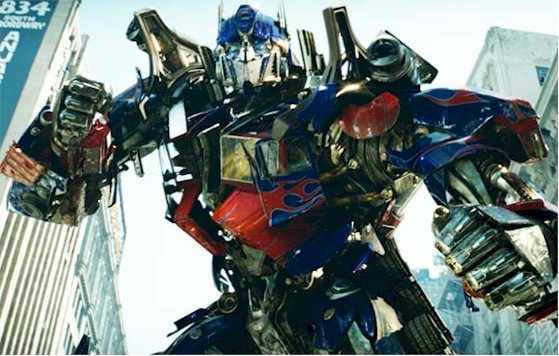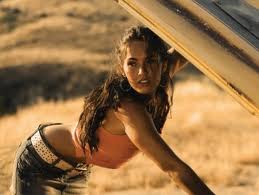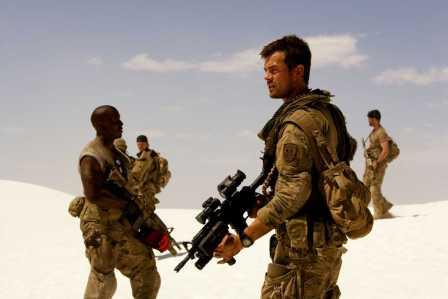 (I know, I know, they’re not androids. Sorry, that song‘s been in my head all week.) Well, I kept my expectations low and didn’t really look for anything other than two hours of air conditioning and some big dumb summer fun. But, even by that low standard, Michael Bay’s Transformers is less than meets the eye. Mind you, I didn’t go in with a litany of fanboy complaints on hand…just as car culture somehow bypassed me as a kid, I never much grokked into Transformers back in the day. I did see the cartoon (and the cartoon movie with Orson Welles) a few times, and tried to reassemble the occasional Decepticon over at one friend or another’s place. And, before seeing this 2007 incarnation, I would’ve thought it was a pretty perfect match of director and material: True, Michael Bay movies generally tend to be terrible (although I didn’t mind The Island so much), but he’s definitely in love with the strict machines, and, if nothing else, has a knack for filming sleek, impressive car chases (cf. Island, Bad Boys 2.) But, this…well, this is about as dull and unengaging a movie about gigantic fighting alien-robots as you can imagine. Sure, the special effects team earn their keep with a few brief, shining moments, but the movie as a whole is a badly paced, surprisingly boring affair…It’s an hour and a half of interminable set-up, long, needless digressions, and military-industrial gobbledygook that eventually descends into stuporous, standard-issue Bayhem. If you were going to see this movie, you likely already have. But, if you’ve been on the fence…abort, retry, ignore.
(I know, I know, they’re not androids. Sorry, that song‘s been in my head all week.) Well, I kept my expectations low and didn’t really look for anything other than two hours of air conditioning and some big dumb summer fun. But, even by that low standard, Michael Bay’s Transformers is less than meets the eye. Mind you, I didn’t go in with a litany of fanboy complaints on hand…just as car culture somehow bypassed me as a kid, I never much grokked into Transformers back in the day. I did see the cartoon (and the cartoon movie with Orson Welles) a few times, and tried to reassemble the occasional Decepticon over at one friend or another’s place. And, before seeing this 2007 incarnation, I would’ve thought it was a pretty perfect match of director and material: True, Michael Bay movies generally tend to be terrible (although I didn’t mind The Island so much), but he’s definitely in love with the strict machines, and, if nothing else, has a knack for filming sleek, impressive car chases (cf. Island, Bad Boys 2.) But, this…well, this is about as dull and unengaging a movie about gigantic fighting alien-robots as you can imagine. Sure, the special effects team earn their keep with a few brief, shining moments, but the movie as a whole is a badly paced, surprisingly boring affair…It’s an hour and a half of interminable set-up, long, needless digressions, and military-industrial gobbledygook that eventually descends into stuporous, standard-issue Bayhem. If you were going to see this movie, you likely already have. But, if you’ve been on the fence…abort, retry, ignore.
 As Transformers begins, the voice of Optimus Prime (Peter Cullen) booms forth the backstory: An ancient cataclysmic war between an alien race of good robots (Autobots) and bad robots (Decepticons) over the whereabouts of an all-powerful MacGuffin (The Cube) has finally spilled over to our planet, Earth. Uh, did I say our planet? I’m sorry, this is in fact Michael Bay’s Earth, where cameras endlessly flit around people like wayward moths, the NSA hires hot Australian coeds to be their top computer experts, and extended scenes involving nothing but pseudomilitary babble is considered compelling. Anyway, while the bad guys play hell with US army units stationed in Qatar, the good guys (for reasons left unexplained) already know to track down one Sam Witwicky (Shia LaBoeuf), a quirky, Cusack-ish eleventh-grader who, when he’s not trying vainly to woo the quarterback’s girlfriend Mikaela (Megan Fox), hawks his Arctic explorer great-grandfather’s personal effects on Ebay. Sam initially encounters these well-meaning alien life forms in the form of his first ride, a bitchin’ Camaro known as Bumblebee (Arguably the movie’s best non-robot-scenes come from the car’s early, Christine-like behavior.) But, soon, he’s met the bad guys too, in the form of a killer cop car known as Starscream. And, before you can say “My, that felt lifted from Terminator 2,” Sam and his new potential ladyfriend (who’s, conveniently, an amateur mechanic) have been irrevocably caught up in the intergalactic-robot melee, a fracas which, it turns out, the MIB-like government suits known as Sector 7 have known about since the days of Herbert Hoover. (Hmm, interesting. Is this dissertation-worthy?)
As Transformers begins, the voice of Optimus Prime (Peter Cullen) booms forth the backstory: An ancient cataclysmic war between an alien race of good robots (Autobots) and bad robots (Decepticons) over the whereabouts of an all-powerful MacGuffin (The Cube) has finally spilled over to our planet, Earth. Uh, did I say our planet? I’m sorry, this is in fact Michael Bay’s Earth, where cameras endlessly flit around people like wayward moths, the NSA hires hot Australian coeds to be their top computer experts, and extended scenes involving nothing but pseudomilitary babble is considered compelling. Anyway, while the bad guys play hell with US army units stationed in Qatar, the good guys (for reasons left unexplained) already know to track down one Sam Witwicky (Shia LaBoeuf), a quirky, Cusack-ish eleventh-grader who, when he’s not trying vainly to woo the quarterback’s girlfriend Mikaela (Megan Fox), hawks his Arctic explorer great-grandfather’s personal effects on Ebay. Sam initially encounters these well-meaning alien life forms in the form of his first ride, a bitchin’ Camaro known as Bumblebee (Arguably the movie’s best non-robot-scenes come from the car’s early, Christine-like behavior.) But, soon, he’s met the bad guys too, in the form of a killer cop car known as Starscream. And, before you can say “My, that felt lifted from Terminator 2,” Sam and his new potential ladyfriend (who’s, conveniently, an amateur mechanic) have been irrevocably caught up in the intergalactic-robot melee, a fracas which, it turns out, the MIB-like government suits known as Sector 7 have known about since the days of Herbert Hoover. (Hmm, interesting. Is this dissertation-worthy?)
 You may think I’m being too hard on this film — this is a movie based on twenty-year-old toys, after all. (One shudders to wonder if Voltron, My Little Pony, Care Bears, Cabbage Patch Kids and Teddy Ruxpin are all getting the live-action treatment in due course.) But, like I said, I’m willing to sit through a lot of deadly-dull exposition in a July 4th movie such as this to witness big robots beating on each other…but not this much exposition. After its Qatar debut, Transformers takes entirely too long to move out of first gear, and even then, it downshifts for bizarre, barely diverting digressions. (See, for example, Sam trying to hide his giant new friends from his parents.) Conversely, by the time the final battle happens in a city somewhere near the Hoover Dam, it includes so much vehicular carnage packed into fifteen-to-twenty minutes that it barely registers. Throw in the occasional blatant message moments like Sam discussing the car not taken, or the revelation of Mikaela’s checkered (flag?) past, and the movie starts to feel like a straight-up stinker. (I haven’t even mentioned John Turturro, who’s more over the top here than he was in Lebowski, and about one-twentieth as entertaining.)
You may think I’m being too hard on this film — this is a movie based on twenty-year-old toys, after all. (One shudders to wonder if Voltron, My Little Pony, Care Bears, Cabbage Patch Kids and Teddy Ruxpin are all getting the live-action treatment in due course.) But, like I said, I’m willing to sit through a lot of deadly-dull exposition in a July 4th movie such as this to witness big robots beating on each other…but not this much exposition. After its Qatar debut, Transformers takes entirely too long to move out of first gear, and even then, it downshifts for bizarre, barely diverting digressions. (See, for example, Sam trying to hide his giant new friends from his parents.) Conversely, by the time the final battle happens in a city somewhere near the Hoover Dam, it includes so much vehicular carnage packed into fifteen-to-twenty minutes that it barely registers. Throw in the occasional blatant message moments like Sam discussing the car not taken, or the revelation of Mikaela’s checkered (flag?) past, and the movie starts to feel like a straight-up stinker. (I haven’t even mentioned John Turturro, who’s more over the top here than he was in Lebowski, and about one-twentieth as entertaining.)
The only thing that redeems Transformers in the end, is the impressive work of ILM — when two robots tumble, skate, and slide across an interstate highway, a scorpion-shaped Decepticon leaps out of the sand behind terrified troops, or Starscream lunges from car to robot back to car in one sweeping arc, Transformers offers a few tantalizing moments of real visual grandeur. In the end (and no disrespect to La Boeuf, who’s actually a pretty appealing presence throughout), it’s the number-crunching machines at Industrial, Light, and Magic that are the real stars here, however brief and flickering. But I guess that makes a certain amount of sense.
